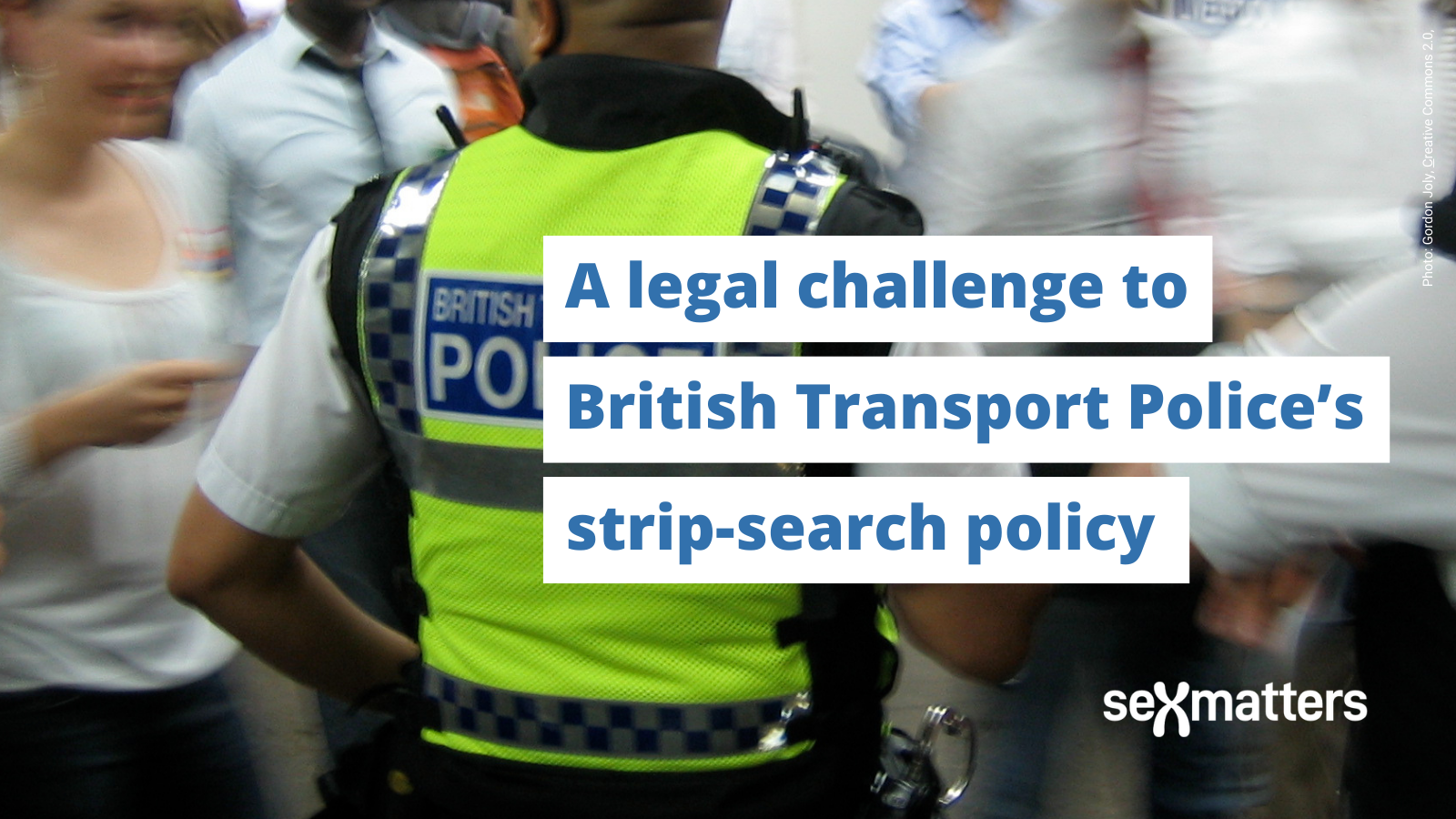Sex Matters is challenging BTP’s abusive strip-search policy

On 30th September British Transport Police (BTP) adopted a new searching policy that allows male officers who have gender-recognition certificates to search, including strip-search, female detainees. This follows the withdrawal of similar guidance by the National Police Chiefs’ Council.
We think it is immoral and unlawful to trick or coerce any woman into being searched by a man, whether or not he has a certificate. We do not think women who are detained and searched by the police are in a position to object to being searched by a man claiming to be a woman.
Sex Matters has filed an application for a judicial review at the High Court and launched a crowdfunder for the case.
BTP’s policy puts detainees at risk of sexual harassment and sexual assault, and is a violation of Article 3 of the European Convention on Human Rights, which protects against torture and inhuman or degrading treatment. The policy also puts female officers in a humiliating and dangerous position, as they may be pressured to search trans-identified men.
In November 2024 we sent the BTP a pre-action letter setting out our concerns and asking it to withdraw the policy immediately, and to confirm that strip-searches will be carried out on the basis of same biological sex only.
We received a response from BTP dismissing these concerns.
BTP’s response:
“A male who is issued with a GRC… is to be considered a female.”
BTP admitted that a strip-search of a woman by a male officer is capable of amounting to a breach of her rights under Article 3, but refused to withdraw its policy, saying that it is “consistent with the current legislation”. BTP argues that the Gender Recognition Act 2004 means that a transgender male with a certificate is female for the purposes of the Police and Criminal Evidence Act 1984 (PACE). BTP said:
“A male who is issued with a GRC stating that they are a female is to be considered a female. Any female searched by that officer is, for the purposes of PACE and UK legislation, being searched by a female officer.”
This denial of reality in favour of a legal fiction leads to state-sponsored sexual assault, where women or girls may be strip-searched by or in the presence of someone they suspect or know to be a man, and be lied to by those whose responsibility it is to protect her from this situation.
We pointed out in our letter that men are responsible for 98% of sex crimes, and that cross-dressing and transsexualism in men have been found in the medical literature to be associated with sexual paraphilias: transvestic fetishism and autogynephilia (a man’s sexual attraction to the idea of himself as a woman). We said a woman forced to undress in front of a trans-identifying man, or a female officer required to search a trans-identifying male suspect, may be being exposed to a behaviour that has its roots in sexual arousal and coercion:
“While it is not the case that every transgender male is paraphilic, the policy of requiring and allowing males to search women (or to demand to be searched by female officers) exposes women to a real risk of deliberate sexual abuse, sponsored by the state.”
BTP responded by simply rejecting the possibility that its policy exposes women to a risk of behaviour that has its origin in sexual arousal, coercion or sexual fetish.
BTP’s equality-impact assessment does say that gender-critical or religious detainees can request to be searched by someone other than a trans officer with a GRC. This option is not in the policy that is being challenged (an EIA should review the decision it is considering, not read into a policy things that are not there, as it is the policy that officers will be following). It is also entirely unclear how this would work in practice. The detainee will not be told that an officer holds a GRC (and is in fact of the opposite sex).
BTP’s attitude is difficult to understand, particularly given recent reviews of police conduct and culture. In 2024 Dame Vera Baird DBE KC undertook a review of custody practice for Greater Manchester Police. She set out that strip-searches are a profound invasion of people’s privacy and bodily autonomy, and are particularly humiliating and degrading for women. In the wake of the abduction, rape and murder of Sarah Everard by a serving Metropolitan Police officer, the Casey Review highlighted weak vetting, vulnerability to predators and attitudes of misogyny within the Met. The Angiolini Inquiry recommended that:
“Police forces should convey to all existing and prospective officers and staff that they must be held to a higher standard of behaviour and accountability than members of the public, and that therefore their right to privacy can be fettered in certain circumstances.”
Lady Elish Angiolini recommended that every new candidate applying to become a police officer undergo an in-person interview and home visit designed to provide a holistic picture of their motivations and psychological suitability. Undertaking this process while pretending that an applicant is not the sex they are turns it into a pantomime. BTP’s policy seems to be driven by an overblown effort to protect the “privacy” of individuals who adopt a transgender identity. Such extreme (and impossible) privacy is unwarranted and inconsistent with the demands of the job.
We have now filed our application for permission to bring a judicial review. Read more about the case and our legal team, and donate here.
